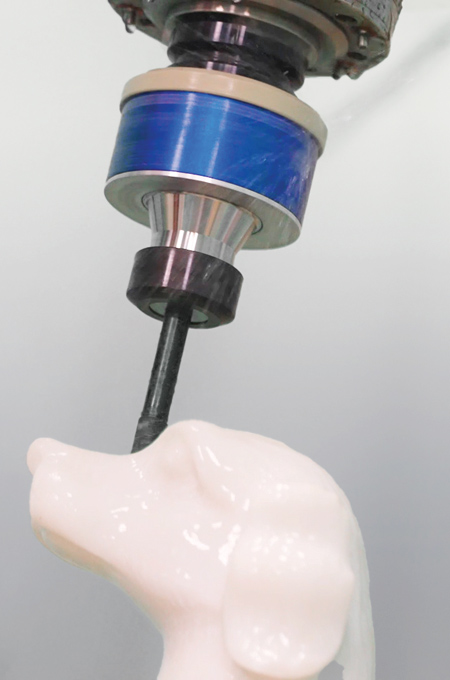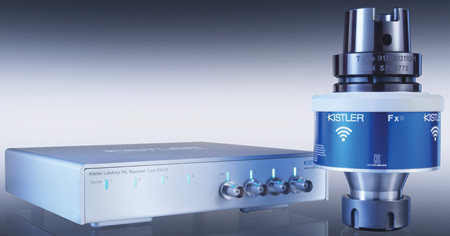
The wireless RCD has already been tested by clients: A research center used the RCD to monitor and analyze stone-carving processes.

The first wireless RCD with a piezoelectric sensor combines flexibility and comfort with highly accurate measurements.
Kistler offers a wireless rotary cutting dynamometer (RCD) with a piezoelectric sensor. It allows for highly accurate measurements of cutting forces in various machining applications. Part of the measurement system is a platform (software and hardware) that performs automated analyses that help to increase the efficiency of working processes. Test series, for instance, can be analyzed automatically by using a predefined analysis configuration for each channel. The analogue outputs and digital I/O enable direct communication with machines and robots, not only to monitor, but also control processes in the future.
RCDs are used by universities, research centers and in tool and machine development, as well as production monitoring to measure cutting forces-specifically in milling, drilling, grinding and super-finishing operations. In machining, part quality, tool life and production time depend on different factors: dynamometers provide data that give valuable insights into wear mechanisms, material characteristics or any machine or process abnormalities. The knowledge obtained from these measurements helps to improve product quality as well as the cost-effectiveness of cutting processes.
Especially in production monitoring, wireless solutions are often preferred since space in machines is limited and the installation of cables to connect the sensor can be difficult or may not be allowed. The wireless RCD from Kistler is the first of its kind equipped with a piezoelectric sensor and connected via wireless technology to the data acquisition device. It comes with four channel piezo crystals to measure torque as well as forces in all three directions (Fx, Fy and Fz). The low energy wireless technology connection has a range up to 5 m to the receiver box, depending on the conditions on site.
Piezoelectric sensors feature a large measuring range up to 20 kN with high resolution (<1N) and a high sensitivity. This allows users to employ the same sensor in a wide variety of applications from roughing down to finishing processes. The wireless RCD from Kistler has a 10 kHz sampling rate that allows users to capture highly dynamic footprints of the measurement in applications with up to 16,000 RPM.
"Overall, piezoelectric sensors ensure more accurate measurements than other technologies, such as strain-gauge sensors, which have significant limitations, especially when measuring small forces and high dynamic processes," said a company spokesperson. "Highly accurate measurements are not only important for research but also for production monitoring. The piezoelectric measurement technology can capture very small changes and deviations before they have a significant effect on product quality."
The new PTS (Piezo Tool System) software accompanying the wireless RCD automatically acquires and analyzes machining data while the machine is running. Users gain optimal insights into the condition of the cutting tool as the software provides automatic signal trend analysis. In the future, the system will also be able to communicate directly with the machine's control unit to initiate, for instance, automated tool changes at just the right moment. This leads to less machine downtime, better cost effectiveness and reduced maintenance efforts. Additionally, the PTS platform automates data acquisition, analysis and registration. This will especially improve the efficiency of testing in laboratories and research centers.
For more information contact:
Kistler Instrument Corp.
30280 Hudson Drive
Novi, MI 48377
248-668-6900
sales.us@kistler.com
www.kistler.com